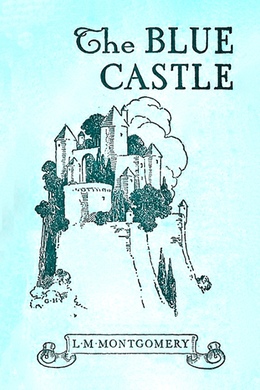
-
EPUB 310 KB
-
Kindle 352 KB
-
Support epubBooks by making a small $2.99 PayPal donation purchase.
This work is available for countries where copyright is Life+70 or less.
Description
Valancy lives a drab life with her overbearing mother and prying aunt. Then a shocking diagnosis from Dr. Trent prompts her to make a fresh start. For the first time, she does and says exactly what she feels. As she expands her limited horizons, Valancy undergoes a transformation, discovering a new world of love and happiness. One of Lucy Maud Montgomery’s only novels intended for an adult audience, The Blue Castle is filled with humour and romance.
272 pages with a reading time of ~4.25 hours (68057 words), and first published in 1926. This DRM-Free edition published by epubBooks, 2018.
Community Reviews
There are currently no other reviews for this book.
Excerpt
If it had not rained on a certain May morning Valancy Stirling’s whole life would have been entirely different. She would have gone, with the rest of her clan, to Aunt Wellington’s engagement picnic and Dr. Trent would have gone to Montreal. But it did rain and you shall hear what happened to her because of it.
Valancy wakened early, in the lifeless, hopeless hour just preceding dawn. She had not slept very well. One does not sleep well, sometimes, when one is twenty-nine on the morrow, and unmarried, in a community and connection where the unmarried are simply those who have failed to get a man.
Deerwood and the Stirlings had long since relegated Valancy to hopeless old maidenhood. But Valancy herself had never quite relinquished a certain pitiful, shamed, little hope that Romance would come her way yet—never, until this wet, horrible morning, when she wakened to the fact that she was twenty-nine and unsought by any man.
Ay, there lay the sting. Valancy did not mind so much being an old maid. After all, she thought, being an old maid couldn’t possibly be as dreadful as being married to an Uncle Wellington or an Uncle Benjamin, or even an Uncle Herbert. What hurt her was that she had never had a chance to be anything but an old maid. No man had ever desired her.
The tears came into her eyes as she lay there alone in the faintly greying darkness. She dared not let herself cry as hard as she wanted to, for two reasons. She was afraid that crying might bring on another attack of that pain around the heart. She had had a spell of it after she had got into bed—rather worse than any she had had yet. And she was afraid her mother would notice her red eyes at breakfast and keep at her with minute, persistent, mosquito-like questions regarding the cause thereof.
“Suppose,” thought Valancy with a ghastly grin, “I answered with the plain truth, ‘I am crying because I cannot get married.’ How horrified Mother would be—though she is ashamed every day of her life of her old maid daughter.”
But of course appearances should be kept up. “It is not,” Valancy could hear her mother’s prim, dictatorial voice asserting, “it is not maidenly to think about men.”
The thought of her mother’s expression made Valancy laugh—for she had a sense of humour nobody in her clan suspected. For that matter, there were a good many things about Valancy that nobody suspected. But her laughter was very superficial and presently she lay there, a huddled, futile little figure, listening to the rain pouring down outside and watching, with a sick distaste, the chill, merciless light creeping into her ugly, sordid room.
She knew the ugliness of that room by heart—knew it and hated it. The yellow-painted floor, with one hideous, “hooked” rug by the bed, with a grotesque, “hooked” dog on it, always grinning at her when she awoke; the faded, dark-red paper; the ceiling discoloured by old leaks and crossed by cracks; the narrow, pinched little washstand; the brown-paper lambrequin with purple roses on it; the spotted old looking-glass with the crack across it, propped up on the inadequate dressing-table; the jar of ancient potpourri made by her mother in her mythical honeymoon; the shell-covered box, with one burst corner, which Cousin Stickles had made in her equally mythical girlhood; the beaded pincushion with half its bead fringe gone; the one stiff, yellow chair; the faded old motto, “Gone but not forgotten,” worked in coloured yarns about Great-grandmother Stirling’s grim old face; the old photographs of ancient relatives long banished from the rooms below. There were only two pictures that were not of relatives. One, an old chromo of a puppy sitting on a rainy doorstep. That picture always made Valancy unhappy. That forlorn little dog crouched on the doorstep in the driving rain! Why didn’t some one open the door and let him in? The other picture was a faded, passe-partouted engraving of Queen Louise coming down a stairway, which Aunt Wellington had lavishly given her on her tenth birthday. For nineteen years she had looked at it and hated it, beautiful, smug, self-satisfied Queen Louise. But she never dared destroy it or remove it. Mother and Cousin Stickles would have been aghast, or, as Valancy irreverently expressed it in her thoughts, would have had a fit.
Every room in the house was ugly, of course. But downstairs appearances were kept up somewhat. There was no money for rooms nobody ever saw. Valancy sometimes felt that she could have done something for her room herself, even without money, if she were permitted. But her mother had negatived every timid suggestion and Valancy did not persist. Valancy never persisted. She was afraid to. Her mother could not brook opposition. Mrs. Stirling would sulk for days if offended, with the airs of an insulted duchess.
The only thing Valancy liked about her room was that she could be alone there at night to cry if she wanted to.
